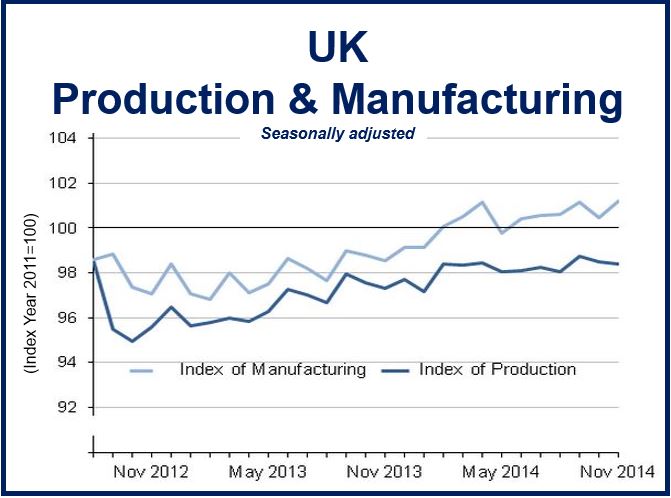Total production in November in the United Kingdom declined by 0.1% compared to October, the Office for National Statistics informed on Friday.
All three main sectors posted declines in November compared to October, with mining & quarrying falling the most (-3.7%).
Manufacturing output was 0.7% up in November from October. The main contributors to the rise were other manufacturing & repair, the manufacture of transport equipment, and the manufacture of basic metals & metal products.
Oil & gas output fell in November by over 5% compared to October due to maintenance work at the oil fields in the North Sea.
Construction output was also down by 2% on the month in November, which surprised economists, who had expected a rebound. All types of new construction work, apart from infrastructure and private housing, reported declines.
Source: “Summary of the Index of Production, November 2014,” Office for National Statistics.
For the three-month period ending November 2014, manufacturing and production were 5.3% and 10.3% respectively below their pre-downturn peaks in Q1 2008.
Total production in November 2014 compared to November 2013 was 1.1% higher. Of the four main sectors, manufacturing was the only one to post an increase (+2.7%). Manufacturing is the largest component of production.
Compared to one year ago, there was growth in 7 of the 13 manufacturing components, with the largest contributors being the manufacture of food products, beverages & tobacco.
The Office for National Statistics also reported today that the UK’s trade deficit contracted in November thanks to much cheaper oil prices. November deficit in goods and services was £1.4 billion versus £2.2 billion in October.
The smaller trade gap was due to falling imports, and not rising exports. Imports fell by £1 billion.
Economists are worried that the UK’s impressive economic rebound is losing momentum. Markit Economics reported that manufacturing growth had slowed to an 18-month low in December. The ONS informed in December that GDP growth between Q3 2013 and Q3 2014 had grown by just 2.6%, and not the 3% it had previously estimated.

